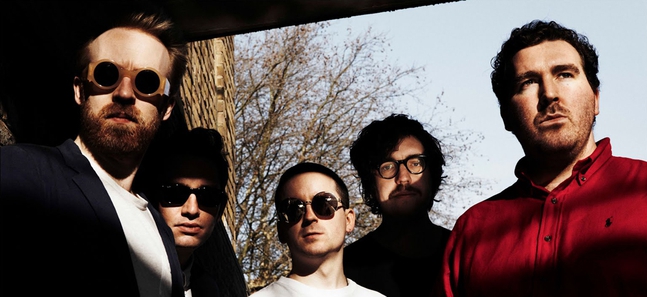Hot Chip: the interview
Alexis Taylor and Owen Clarke talk influences and ‘In Our Heads’

Posted: Fri Jun 15 2012
Like an English cousin to LCD Soundsystem, Hot Chip have made a virtue of being music geeks. The group synthesise their literate, danceable pop songs from a dizzying range of influences, covering anything from Chicago house to Howard Jones, The Beach Boys to Brian Eno, Prince to Paul McCartney. After the intimate sounds of 2010's One Life Stand, they make an emphatic return to the dancefloor on the just-released In Our Heads, their fifth – and, depending on who you ask, best – album to date. The group will be heading to Tokyo to give local audiences a taster at the Hostess Club Weekender, with chief songwriters Alexis Taylor and Joe Goddard also making time for a DJ set at Sound Museum Vision a couple of nights earlier. We spoke to Taylor and bandmate Owen Clarke about keeping things fresh, and how he nearly beheaded someone with a Wiley record...
It feels like you come blazing out of the gates on In Our Heads. Did you want to get people dancing immediately?
Alexis: To be honest, every record we make, we try and make quite a lot of it uplifting. I don't think it's the first time we've done that. I feel like the beginnings of previous records were very similar to the beginning of this one: there's a similarity in terms of a long opening track that is quite triumphant-sounding musically, and then you go to something like 'Hand Me Down Your Love' on One Life Stand, 'How Do You Do' on this record. Not to suggest that we're just repeating ourselves over and over again, but there's an interest always in uplifting music, and there's an interest in things that are a bit more introspective and reflective. Those two things always seem to sit together, and they reflect different sides of our personalities – but the ones that come to the forefront on all Hot Chip records.
Owen: We don't sort of plan to have an 'Okay, this is going to be the uplifting album' sort of thing. I think it just sort of springs from more subconscious things, and then perhaps an excitement of being in the studio, and the sounds are on command and it kind of feeds upon itself and gives itself its own energy. I mean, you can't have unbridled joy – it's a bit much – and so you need to have shadow for the light and things like that.
Lots of bands don't like to be pigeonholed, but you often seem quite happy to compare yourself with other music and musicians. Why is that?
Alexis: Well, we just love lots of records, and we're open about the fact that we love them and are inspired by them. But I don't think that our records really sound like Phil Spector records or Beach Boys records or Timbaland records, so maybe that's why we're all right to talk about: because we have enough of a belief in our own sound being its own thing. Whereas if you're trying to hide your references and just pretend that you're like the most unique band, with a fresh take on everything... I mean, who would believe that about most bands, you know? Right from the beginning we found it quite easy to talk about music that inspires us, in the hope that that will help people know where we were coming from musically.
In Our Heads is your fifth album so far. How do you keep it fresh?
Owen: We give ourselves opportunities to explore new sounds, like, without Hot Chip. I think that's a healthy thing to do. It means when you come back to it, a way of working that may seem methodical – building on what happened in the past – is actually a new opportunity, because you've had these other things to do, whether it's a very dancey thing or DJing or if it's an improvised thing or very rock-based thing. When you come back to it, it feels fresh again.
Alexis: Earlier on in our career, I considered this idea of making more of a change from record to record because I knew that we were interested in lots of different styles of music. So we could have done that – in the same way other artists sometimes do, and they shake things up drastically – but actually I like the fact that things come together quite naturally without a plan, and those things coming together is what Hot Chip is. I think you can see a development from one Hot Chip record to the next and you can see a development from Pet Sounds to Smile – there's a clear development, but the records are related to each other. From Revolver to Sgt. Pepper there's a clear relationship, from Prince – records like Parade to Sign 'O' the Times, they are quite different but they're also kind of connected. That's not to say that we are making music in the same way as those artists, but those records were an inspiration to me and we don't feel the need to make a kind of drastic about-turn every time we do something. I suppose we're trying to develop what we're doing: almost exploring the same type of thing every time, but hopefully getting better at it, refining it somehow.
Alex, you have your project About Group, and Joe has The 2 Bears. What role do those side projects play in Hot Chip?
Alexis: When I first did a solo record, Rubbed Out, I think that was very important to me personally to have an opportunity to make music that didn't go through the process that a Hot Chip record would go through. So it was important, musically, that things that were meant to be thirty seconds long, or meant to be quiet, or meant to be only two instruments playing didn't turn into something that was a pop song or a house record (or just get forgotten about because it's not a house record or a pop record). It felt at that time that everything in Hot Chip was towards this sort of goal of making people dance, and I actually think that if I hadn't done the solo record there would have been more frustration, and so that might have made it harder to keep going with Hot Chip. And if I hadn't done that, I'm getting the impression Joe might not have done his solo record, 2 Bears might not have happened quite the same way, About Group might not have happened. Because we started to be more open-minded about, not everything has to be Hot Chip, you know? I remember just thinking: we want Hot Chip to keep going, but not everything we make needs to go through this particular band.
Do you still see Hot Chip as being part of club culture?
Alexis: I don't think about those issues, really: I just respond to whatever song ideas come to me or whatever song ideas Joe brings to me. I think he's more driven by an interest in club culture than I am, but there's a value in both types of song that we write. If we want to be crude about it, there are kind of slower ones and then faster ones, and they're both just as important to me, but I never think in advance, 'How can we still be relevant to the club?' I just think about making records and music, so some of them function in that way and others don't.
The lyrics for lead single 'Night and Day' are pretty acerbic. Were they based on a bad experience you had?
Alexis: The moment that inspired me to write the lyrics in 'Night and Day' was a horrible, horrible event that I DJed at, where people like Pippa Middleton were there and someone was playing bongos over the top of the DJ set – and I had no say in the matter, they just were going to play bongos over it. It was in a rich country mansion, and one of the neighbours who lived in the same area walked in and unplugged everything to make the music stop because he was trying to get some sleep, and then ten minutes later we plugged everything back in and he came back and he found the power for the whole venue and he unplugged that. And then I was still told, 'You have to carry on', so I carried on. And then some really obnoxious posh people who claimed they were running the event started telling me what I had to play, and I was playing a garage record after a while and people were leaning into me and saying, 'Yeah yeah play more! Play more like that, that's it, that's it!' So then I put on that record 'Wot Do U Call It' by Wiley, and then still more people were complaining and saying 'Do something else!' So at that point I just picked up the record, stopped what was happening and threw the record through the room and pushed the turntables off and just said to them, like, 'You have to book someone else. Because you're telling me that you booked me, but you're telling me what to play and it's not what you want, so…'. And that's why I wrote those words. I realised instead of pushing a turntable on the floor and nearly beheading someone with a Wiley record, it might be better to have something that you can just play at the point where people start asking for requests, and you can just say: 'Here's my response.'
Hot Chip play Hostess Club Weekender, June 24 at Yebisu Garden Hall. Alexis Taylor and Joe Goddard also DJ at Dommune, June 21 and DFA Night, June 22 at Sound Museum Vision
Tweets
- About Us |
- Work for Time Out |
- Send us info |
- Advertising |
- Mobile edition |
- Terms & Conditions |
- Privacy policy |
- Contact Us
Copyright © 2014 Time Out Tokyo














Add your comment